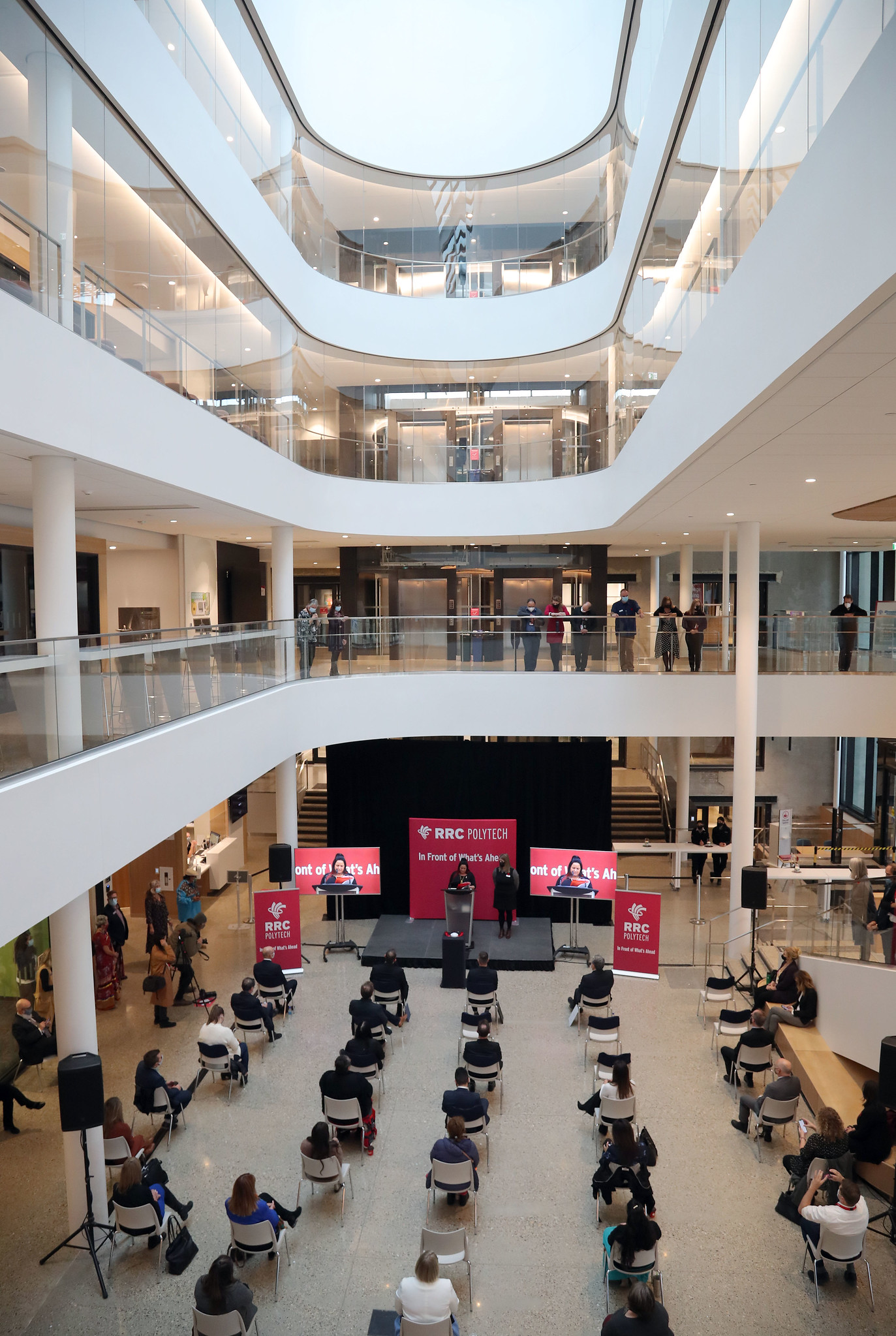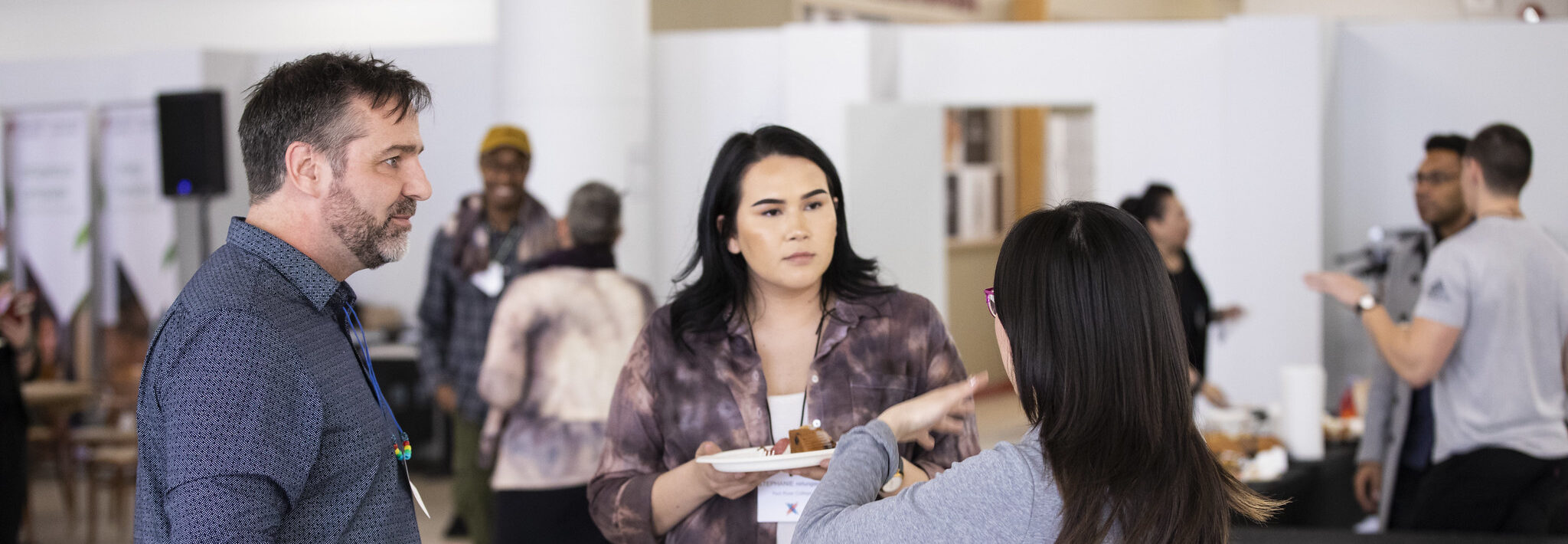What you need to know about career fairs
Let’s face it: career fairs can be intimidating!
People are standing around tables, handing out pamphlets; some are in shirts and ties, some in company T-shirts—all of them, beckoning you to their table with the promise of a free lanyard.
Don’t worry! It can seem overwhelming at first, but when you know what to do and say at a career fair, it’s much easier to navigate.
Career fairs are a safe space to gather information about different employers, so don’t be shy. There are no bad questions to ask; and here we’ve gathered some tips for when you prepare to attend and some good questions to ask employers to get you started!
Career Fair Preparation Tips
What to wear
Business-casual is usually a safe bet. You might ask, “what does that actually mean?” Here’s a quick rundown:
T-shirts, long-sleeved shirts, or button-up shirts with solid colours or simple patterns work well.
Jeans, pants, skirts, and dresses are the go-to. Shorts or ripped pants are too casual—but it’s winter now, so we probably don’t need to worry about that!
Shoes can be free-style, especially since it’s winter. We don’t expect you to show up wearing high heels or dress shoes, or for you to change your boots to walk around the fair. Wear whatever is comfortable to walk around in.
*There’s no dress code for the Indigenous Career Fair though, so feel free to come as you are. What you usually wear to class will likely work. Just keep in mind that you’re making a first impression with potential employers!*
What to bring
The main things you’ll want to bring are your resume and an idea of what kind of job you want. Print a few copies of your resume in case you want to leave some with employers. Five to ten copies should be fine, but if you need to print more, printers are available throughout the campus that you can access using Paperclip.
The other thing you might want to bring is a notepad, in case there’s information you want to keep track of when you’re chatting with employers. We’ll provide pens at the registration desk, so we’ve got you covered!
What to do if you make a career connection with an employer
Fantastic! You’ve hit it off with an employer, you left your resume with them, and they said they’d follow up; or, best-case scenario, they schedule an interview with you. What do you do now?
First thing’s first: get their contact information. It can be a general intake email or phone number, or the direct contact information of the hiring manager. Direct contact information with the hiring manager is better, since you’ll be able to address them by name in the follow-up.
Once the career fair is over, make the first move! The next day or the day after, send them an email or call to confirm the appointment if you’ve made one, or if not, just to thank them for their time at the career fair. Reference anything you might’ve talked about, and that will solidify you in their minds as a strong, interested, and confident candidate. If you didn’t get an interview at the career fair, this might just be the thing that tips the balance in your favour and land you that interview.
If that’s too bold for you, that’s okay too—just make sure that you remember their number, save it in your phone, or be open to calls from unknown numbers. It might be them following up with you!
What to do if you don’t make any strong connections with employers
You’ve checked out all the booths, talked to a couple of employers, maybe left a resume or two, but you came away without feeling that swell of excitement you get when you’re expecting a follow-up. That’s okay! Career fairs won’t always have the perfect job, employer, or industry for you at the moment.
Even if you strike up a conversation with the people at the booths, that’s a win. Keeping that contact information and network might open up opportunities for you in the future. Tell the organizations what you’re looking for, even if they are hiring for a position that doesn’t fit; you’ll never know if in a month, they’re looking for someone with your exact qualifications! Organizations will usually keep resumes on file for a certain amount of time and pull them when there’s a new position open.
If you’re interested in a certain organization, this is a great strategy to stand out—they’ll remember speaking to you at the career fair, which will make your resume shine among the many other resumes of people they haven’t met when they need to look at them.
And lastly, just come with an open mind! This is just one of many networking opportunities you’ll have in your career.
Questions To Ask Employers

You’re there to explore the different job options available, and employers are there to promote their job openings. You want to make sure the job you land helps you grow, compensates you fairly, and supports you culturally, financially, emotionally, and mentally. It’s up to you to decide if an employer is a good fit for you before they decide if you are a good fit for them.
You know what’s most important in a job for you, but here are some questions to get you started. These questions to ask employers can help you decide if you want to throw your hat in the ring for their job posting.
What position are you hiring for?
The most important answer for you to know.
You might know which positions you want, but then again you might not—it’s a good idea to go over your own skillset and to research roles you think you would be good at beforehand.
Even if the position sounds like it doesn’t align with your skillset, keep chatting! Be curious, find out what kind of person they want for the role. It might surprise you—you may actually have the right skillset, or they might ask for your resume to keep on file if a more fitting position opens up in the next few weeks or months. Every booth is an open door!
What are the responsibilities that come with this role?
Usually this is the follow-up information when they tell you the title of the position. This information will help you determine if the role is aligned with your current skills and goals.
If only half of the responsibilities sound like things you know how to do, don’t worry! Organizations might have opportunities for their employees to develop professionally and may provide training for things you don’t know how to do yet. It can pay off in the end for an organization to train the employees they have or the employees they hire on (like you!), rather than continually look for someone that checks off all their boxes right off the bat. What’s valuable to them is your willingness to learn with them.
So, if you want to stand out, be honest! You don’t have to share what you can or can’t do right now, but if you snag an interview with them later, be honest about what you can do or have experience with. Even if you don’t check all their boxes, let them know that you’re willing to learn on the job! It gives them a sense of what to expect of you in that position and where they can help you grow, and what you can provide them with when you start (and so they aren’t overloading you with things you don’t know how to do yet).
What is the pay rate?
Pay is a huge factor when considering your job options. If they don’t volunteer this information, don’t be shy to ask! Everybody needs to know what their compensation will look like to know if they want to pursue an opportunity.
A good thing to know when deciding if a wage or salary is sufficient for you, a living wage in Winnipeg is $18.35 an hour full-time (or $36,700 annually) for both parents of a family of four, according to the Canadian Centre for Policy Alternatives as of August 2022. (Living wage means to be able to pay off all your expenses like groceries and bills from month to month.)
A lot of employers will say the pay varies, but generally they’ll give you a range like $40,000 – $45,000 a year, which is something you can negotiate when you get to the interview part of the hiring process. It’ll depend on what you ask for and your qualifications.
What are the benefits?
This will depend on the hours of the job. If it is full-time, salaried, then there will usually be benefits like dental coverage, eyecare coverage, mental health care coverage, among others. Positions that are not full-time will have limited additional benefits.
Coverage means the organization will reimburse the cost up to a specified amount each year. For example, you could claim up to $1000.00 per year in coverage for mental health services like therapy or psychological evaluations. They will pay up to $1000.00 to your provider, and after that amount, you will be responsible for the costs.
Another way organizations might cover your benefits is providing a certain percentage for each instance you use a covered service. For example, your employer might cover 80% of your dental cleaning service, so you only have to pay the remaining 20%.
Organizations will often use a third-party service, like Blue Cross or Canada Life. They’ll go over your benefit coverage in more detail once you’ve been hired on.
Is it full-time or part-time? Permanent or term? What are the hours like? Is there schedule flexibility?
The hours can help you plan the job into your lifestyle. Sometimes there will be a set expected timeframe in which you’ll work.
Some jobs will be term, which means there will be a set number of months they will want you to work, and after a specified date, the term contract will end. Others will be permanent, which means you stay in that position for the foreseeable future. Sometimes term positions can evolve into full time jobs.
With the “new normal” in 2023, it could be useful for you to know what kind of options they offer in the event you need to isolate.
What kind of supports are there?
Supports like mental health support, cultural support, professional development support, and parental leave are just some of the supports that organizations offer to their employees. Depending on your future plans and what you need, these can be a huge boon to you in the future.
In addition to their benefit coverage, the organization might offer opportunities to their employees like on-demand mental health services, cultural events like Sweat Lodges, training courses and seminars, industry conventions, among many, many others.
Is there an option to work remotely? Hybrid?
This won’t apply to every industry, but if you have the opportunity to work from home, that could be a big money- and time-saver.
Does the company encourage professional development?
This is a great question for students to ask! If you still have a few years yet before you graduate, you could snag a position on a part-time basis and then move into full-time when you graduate. Even if you have graduated or are going to graduate soon, this could open up more training opportunities in the future so you can expand your skillset.
What’s your favourite part about working for this organization?
Anyone who enjoys their career and is trying to get new people on their team will love this question! Knowing what current employees like about their jobs can help you decide if the job and organization has potential to meet your expectations.
Asking a personal question like this is a great way to make a connection with people at the booths. It shows interest in the organization and the people that manage it. This question also serves a practical purpose: knowing why current employees like their organization might sell you on that organization too!
And there you have it! How to prepare for a career fair and questions to ask and get your foot in the door with potential employers.
Even small talk like, “Hey, how are you?” with people at the booths can jumpstart a long-lasting and beneficial relationship between you and that organization. Even if you don’t land that job right now, you will have the network you build here under your belt and can return to it in the future.
Have fun and good luck! We’re looking forward to seeing you next Wednesday at Manitou a bi Bii daziigae in the Agora!
If you haven’t already, pre-register with the WCC for a chance to win one of two $50.00 SkipTheDishes gift cards!
RRC Polytech partnered with the Winnipeg Chamber of Commerce and the Indigenous Chamber of Commerce to make this event possible. Check back here for the bios of the panelists and hosts for our noon-hour Panel Discussion!

